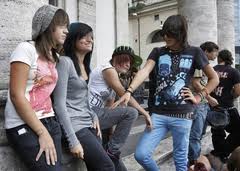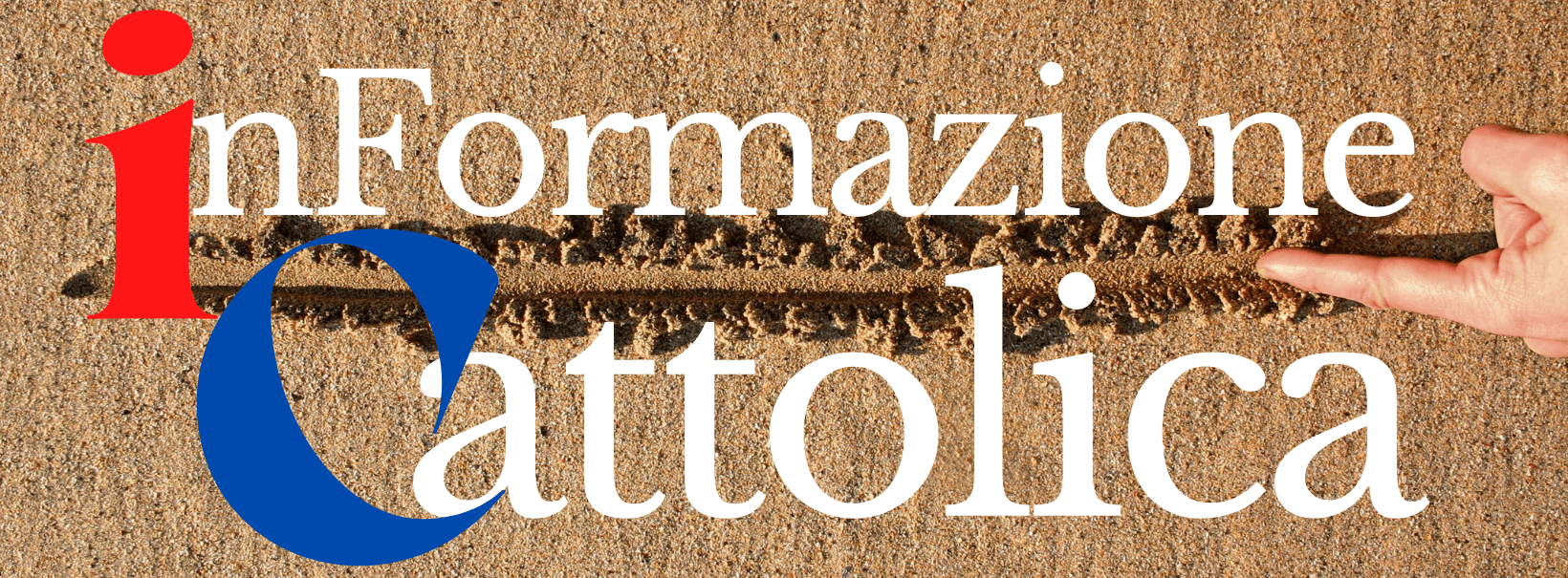 Observatory Cardinal Van Thuân On the Social Doctrine of the Church Newletter n.455
Observatory Cardinal Van Thuân On the Social Doctrine of the Church Newletter n.4552013-11-15 Press Release
These difficulties stem from “a mentality and a form of culture that lead people to harbor doubts about the human person, the selfsame meaning of truth and good, and, in the final analysis, the goodness of life itself. It therefore becomes difficult to hand down from one generation to another anything sound and certain, codes of conduct, and credible objectives around which a person can construct his own life”.
The acceleration of the phenomena of the degeneration of education has now brought the situation beyond this vision of things. The front of the education emergency has turned into something else, and this to the degree that by now we have to talk in terms of a new education emergency, or, even better, an education alarm.
The new fact was the eruption of gender ideology into education, especially in schools.
In the wake of the approval of the “Charte de la laïcité” prepared by Minister Peillon, France is preparing to introduce an hour-long class on ‘non confessional morality’ into secondary schools as of 2015. The State is imposing its own civic religion and its own public ethics in an effort to mold citizens according to the teachings of Rousseau.
In Italy, the “National Strategy for preventing and combatting forms of discrimination based on sexual orientation and gender identity”[1] prepared by the Ministry for Equal Opportunities and the UNAR (National Racial Antidiscrimination Office) is producing its effects in schools: the courses for teachers are imprinted by gender ideology.
Contributing to this is RE.A.DY, the Network of public administrations against forms of discrimination based on sexual orientation and gender identity, which provides both support and sponsorship. Operational on the local level is ideologically oriented educational collaboration among local health boards, municipal authorities, public schools and LGBT associations. The Italian government now in office approved a decree[2] that has already received the green light from the Chamber of Deputies and is now under discussion in the Senate. This decree earmarks an amount of Euro 10 million in 2014 for the training of teachers to “overcoming gender stereotypes”[3].
The so-called bill on homophobia has already been approved by the Chamber of Deputies and is likewise under discussion in the Senate. If it does become law, it would create a framework of ideological intolerance, and, together with the aforementioned decree, would establish in schools a cultural climate ejecting the natural family from the education picture altogether.
A further cause for alarm can be seen in how sexual education is taught in Italian schools. What prevails is a single approach based on contraception and abortion, and this is now flanked by gender ideology. In his speech to the diplomatic corps on 10 January 2011, Benedict XVI said: “Continuing my reflection, I cannot remain silent about another attack on the religious freedom of families in certain European countries which mandate obligatory participation in courses of sexual or civic education which allegedly convey a neutral conception of the person and of life, yet in fact reflect an anthropology opposed to faith and to right reason”[4].
Alarm bells are also starting to ring in the area of textbooks. During discussion on the aforementioned school decree in the Chamber of Deputies, the government endorsed a motion introducing respect for the code of equal opportunities into textbooks[5]. Major discussion has already taken place in France this area over the past few years, and is still underway, but this matter is now becoming a cause of serious concern in Italy as well. In light of the evident ideological characterization of many of the textbooks used in schools, this has always been a problem. Nowadays, however, it is becoming all the more alarming insofar as scientific textbooks are propagating a sort of gender pseudo-science more and more.
There are also other developments of grave import: the opening of kindergartens where little boys and girls are not helped to correctly cultivate their own sexed identity, but educated in a ‘neutral’ way while waiting to decide what they will be in the future; the increased use of fairy tales for small children, plays and theatrics for schools, etc., where the natural approach to sexual diversity is overwhelmed by the new gender ideology; the centralized government planning of sexual education provided in a questionable manner from very early childhood, and as foreseen by the WHO-Europe[6], etc.
All these elements, as well as the situation at large, cast very disturbing beams of light on the education of our children, and in this regard no one can feel they can remain silent.
These phenomena have turned the education emergency into an emergency alarm. It is no longer just a matter of not knowing who is the person to educate; the new development is that we know this very well. People do not refrain from educating children and adolescents, abandoning them to their own devices, but take positive action to educate themagainst nature. People do not just set human nature aside, but want to transform and recreate it.
In the face of this new situation the Observatory would like to offer input for consideration on three points.
The first is a suggestion to raise the issue of the concrete freedom of education in a new way. This is a subject that ordinarily comes to the surface only when non public or private schools are in economically difficult situations. Catholics have to have a deep sense of the formidable importance of this freedom and be suitably educated to preserving and even heightening it.
The lay or non-confessional front considers this to be akin to a mine field replete with potential dangers. In the face of the very serious dangers projected by the education alarm, the battle for the freedom of education must be brought to the forefront and waged with perseverance and awareness. Parents are losing the possibility to educate their children not about things of marginal importance, but about the selfsame identity of human nature.
The second point has to do with a fact: we are face to face with a rationale or logic which in its own way is consistent and rigorous. Many are those who think there can be a moderate and open-minded laicity. Nonetheless, in the face of the aforementioned phenomena, which by now impact not only nations governed by ‘Jacobin’ systems, but also those characterized at the outset or in the past by a respectful equilibrium between politics and religion, we note that moderation may also be a policy applied temporarily and in some contingent situations.
Once God has been eliminated from public life, however, the next and logical step is to eliminate humanness. This is an ever more demanding and aggressive secularization, which, however, is often mistaken for laicity and nothing more.
The third point is an invitation to mobilization. Just like any person emancipated from the sirens of his or her time, Catholics cannot just turn their backs on this state of affairs. In this case it comes down to a pressing request for a sterling witness of charity; yes, charity, and not just truth.
Trieste, 12 Novembre 2013
[1] Cf. http://www.pariopportunita.gov.it/images/strategianazionale_definitiva_logocoenuovo.pdf Per una analisi cf: http://www.vanthuanobservatory.org/notizie-dsc/notizia-dsc.php?lang=it&id=1675
[2] This is decree 104/2013 entitled “La scuola riparte”, approved by the Chamber of Deputies on 31 October 2013. Cf P. Ferrario, La teoria del gender vuole entrare in aula, “Avvenire” 5 novembre 2013, p. 11.
[3] Article 16/d of the decree earmarks that amount “to increasing competencies relative to education to affectivity, respect for diversity and gender equal opportunities, and to overcoming gender stereotypes, thereby implementing article 5 of Decree/law 14 August 2013, n.93, amended and brought into force by Law n. 119 of 14 August 2013”.
[4] Cf: http://www.vanthuanobservatory.org/notizie-dsc/notizia-dsc.php?lang=it&id=1115
[5] http://www.corriere.it/scuola/13_novembre_01/ok-bonus-digitale-fai-da-te-orientamento-d1b8f352-42d0-11e3-bd09-5fafe7fa6f7b.shtml
[6] Cf V. Daloiso, Sessualità, dall’OMS linee ambigue, “Avvenire” 5 November 2013, pg. 10. Excerpt from Zenit (www.zenit.org), 29 October 2013: “A few days ago the European office of the World Health Organization released the document entitled Standard for Sexual Education in Europe intended to offer guidelines for the sexual education of children as of a very early age. The document proposes instigating children to sexual acts such as infantile masturbation, exploration of one’s own body and that of others as of the age of four, and sexual experiments between children of the same sex before the age of 6. The most serious aspect, however, is the wish to impose State education on families, and hence on children, and in this sense the State enjoins its own morality and its own ethics based on opinion”. In fact, however, this WHO document dates back to 2010, and few were those who spoke out against it backthen. In May 2013 WHO-Europe drafted the document “Guidance forImplementation“. On the first WHO document see: http://www.vanthuanobservatory.org/notizie-dsc/notiziadsc.php?lang=it&id=1115. Both documents are accessible on the WHO-Europe website: http://www.bzga-whocc.de/?uid=53d24f0724ffcbe839e48e7405ae27ab&id=home.




